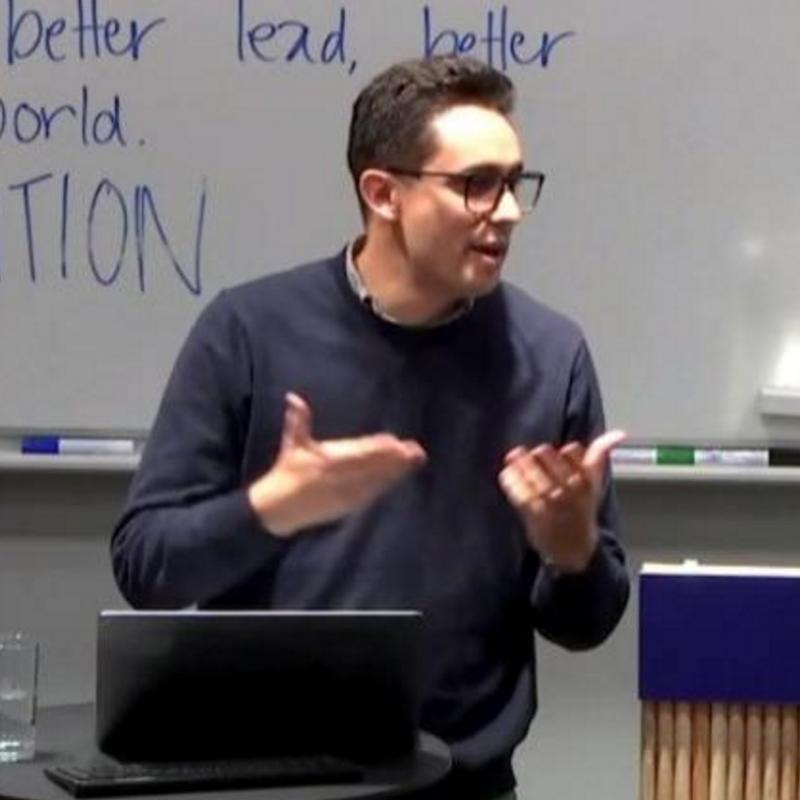Breadcrumb
Many who come to study at Oxford praise the city’s capacity to foster deep intellectual conversations, sometimes with perfect strangers.
For Francisco Carrillo Magna (MPP 2021), this has been a special part of his first term at the University:
“One of the most interesting parts for me has been that people in this city are very keen to share their knowledge. I was recently in my college bar and got to talking with two strangers about philosophy and Marxism. This can be a bit overwhelming at first, but there is always an opportunity to learn from someone. It’s much easier to build strong relations with people when you’re having these conversations.”
The Blavatnik School of Government, where this year 141 students from 48 different countries joined the MPP, is one such place where these conversations have flourished:
“It’s not just about the content of the course but about all the people here and their life stories…When you’re in these kinds of intensive situations together – where you’re working very hard and far away from your home and families – you build strong relationships very quickly.”
Francisco joins the MPP class of 2021 as a Luksic Scholar with ten years of experience working in the government of Chile. An economist by training, his career began as an analyst in Chile’s Ministry of Labour. The experience was foundational to his long-term interest in policymaking:
“A combination of luck and merit brought me into high-level policy discussions at a very young age. I was part of a team of advisors at the ministry and that experience taught me a lot about how policies are developed in the real world. You have to negotiate with others, you have to come to agreements. It’s not just about the technical side of a policy but also the politics. This really got me interested in policymaking.”
While in some countries civil service appointments retain a level of political neutrality, Francisco remarks that the most senior positions tend to change with the political cycle. For this reason, he decided to become more politically involved in his home country, first working at a think tank with liberal political leanings and next by supporting two presidential campaigns. Most recently, he led a team in Chile’s Ministry of Social Development working on transforming the delivery of social services.
Choosing to take a break from this career and undertake such an intensive programme was not an easy decision for Francisco. His role at the Ministry of Social Development was demanding, with significant responsibilities that only increased during the COVID-19 pandemic. After this intensity, he found himself at a crossroads. Would he start moving towards a political career, or take a break to study and reflect on how he wanted to contribute to social change in Chile?
Francisco decided that in order to contribute in a more meaningful way to the social crisis in his home country, taking a break from his career to study would give him space to explore how to make the biggest impact.
“When you have been working so hard for your government, as so many people on the MPP have, there is never a ‘good time’ to do these things. For me it was about deciding to put myself first and make this investment in my career and my future.”
When Francisco was looking into public policy programmes, the Blavatnik School of Government's MPP was a standout:
“No other programme in the world has such an applied focus. It’s not just about learning equations or theories. It’s also about networking, discussing policy challenges, considering perspectives from the private sector, NGOs, politicians and policymakers. If you’re planning to introduce some kind of transformation in your country, this sort of training is important.”
Francisco had heard about scholarship opportunities from the Luksic Scholars Foundation in the past, so when he found out that the foundation funded Chilean students pursuing the MPP at the Blavatnik School, he knew he had to apply. When the School offered him the scholarship it was a special moment for Francisco, who continues to support his young daughter back in Chile while taking the MPP.
Now in Oxford, the openness of the School community has made settling into this new city and programme much easier. Learning to confront prejudices and to understand the thinking behind others’ prejudices around certain topics in policy has been eye-opening. Francisco also praises the value of small classes for facilitating open discussions on complex philosophical themes in a non-judgmental environment.
After his studies at the School, Francisco will return to Chile to serve his country. Before beginning the MPP he set up a small consultancy firm helping to link social initiatives with private sector investments, which he hopes to continue after his studies. Though his primary policy interests remain in labour markets, social policy and equitable growth, he also hopes to return with further knowledge in public sector management:
“The UK is very well known in my country for its innovations in digital government and NESTA foundation is a huge benchmark in Latin America. I really want to get involved in the UK’s culture of innovation in the public sector.”
November 2021.

